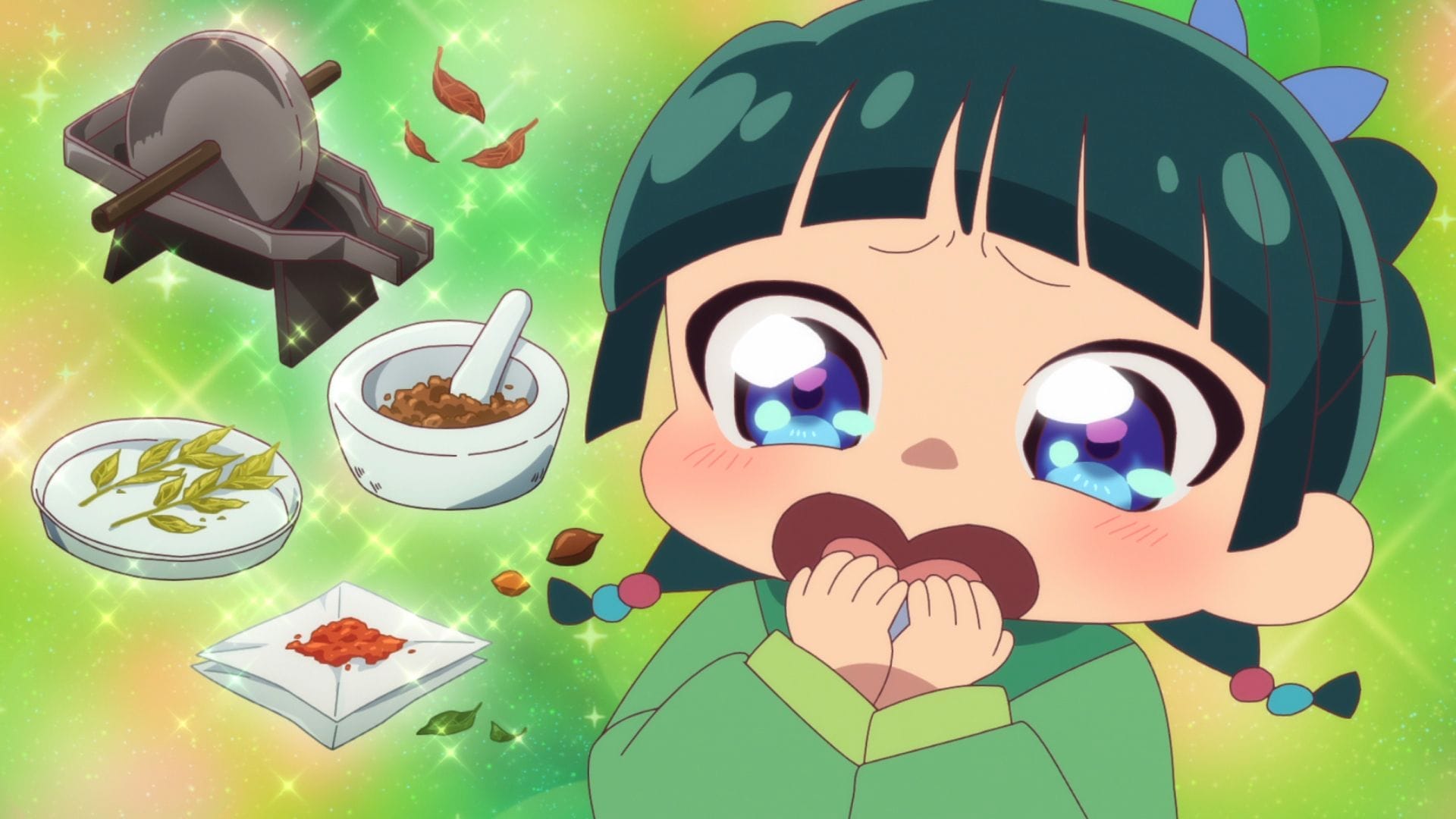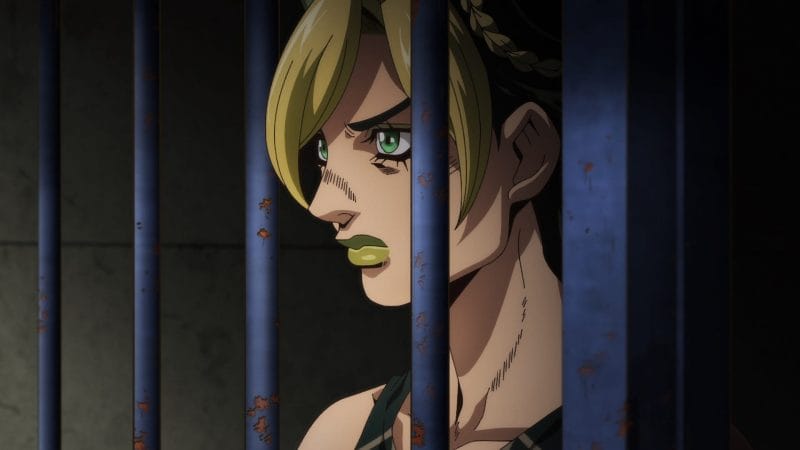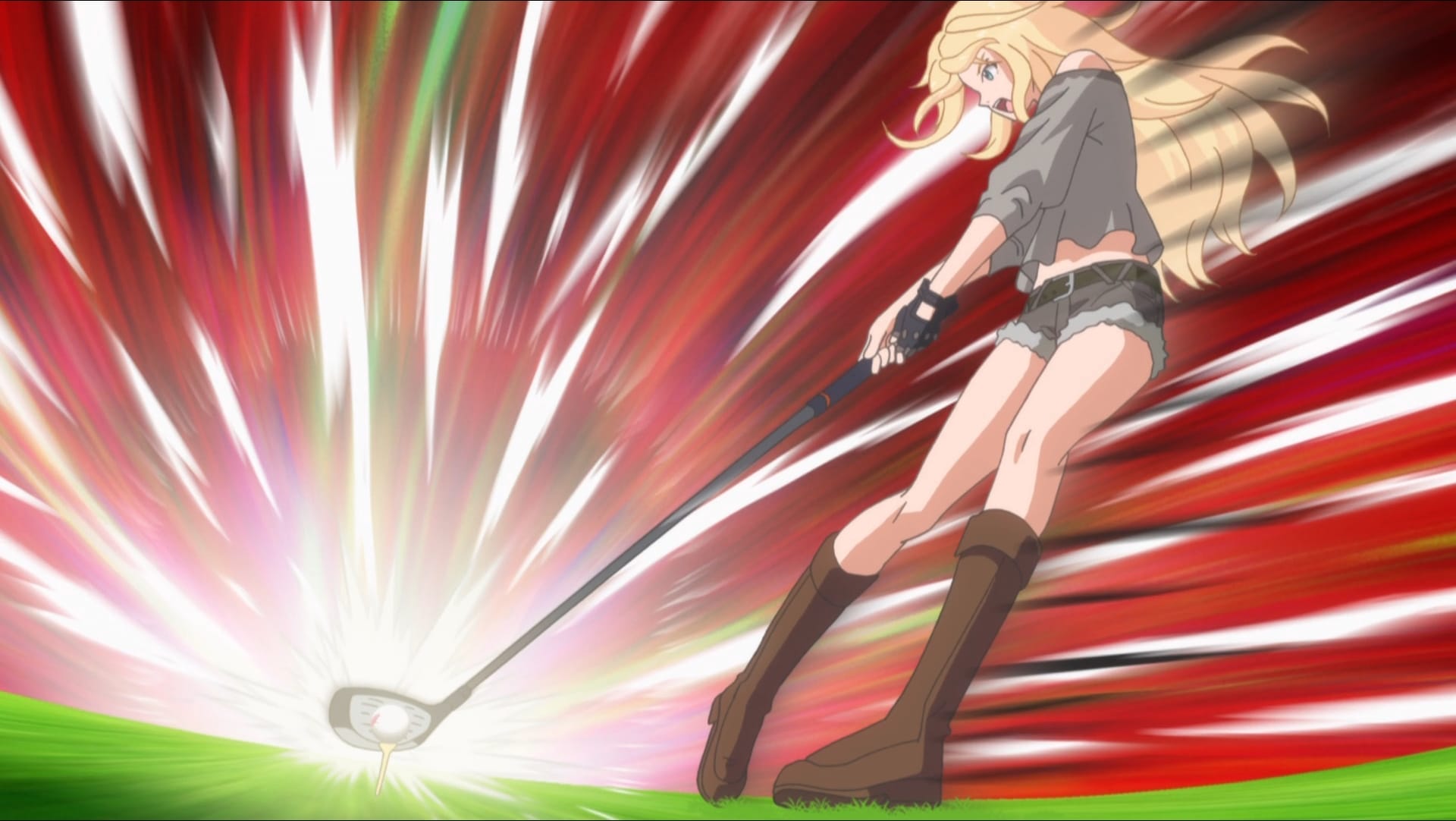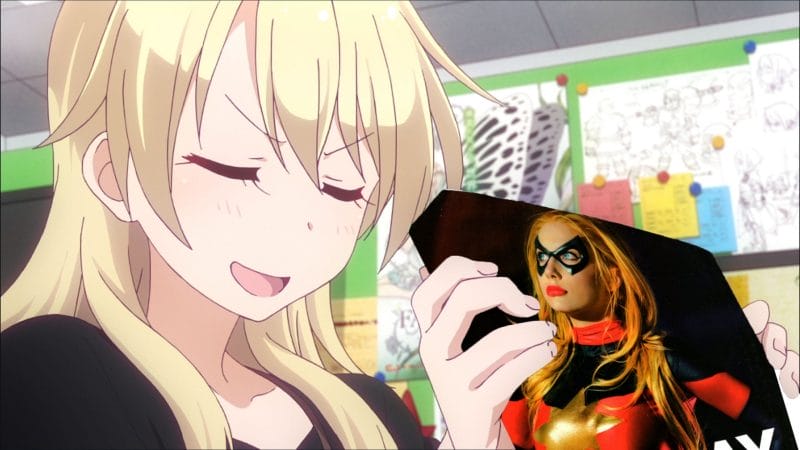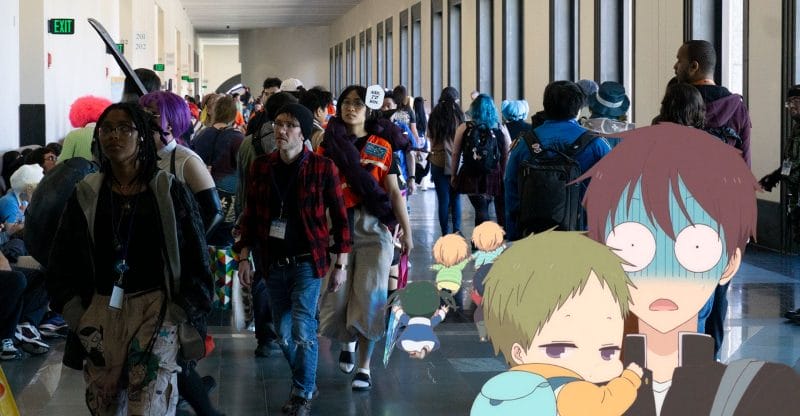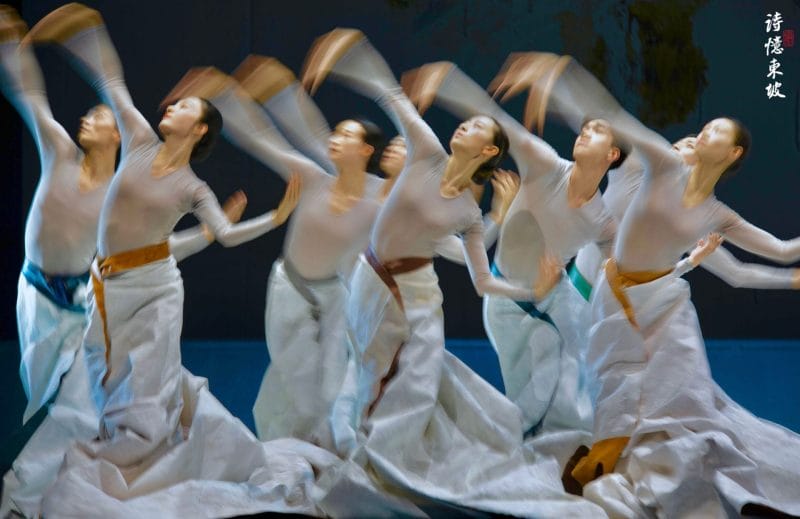Table of contents
- Introduction
- Elementary, My Dear Herbalist: Maomao’s Overture of Intrigue
- Episode 1: Maomao’s Debut: Unraveling the Palace’s Poisonous Secrets
- Episode 2: Maomao’s Concoctions: A Taste of Seduction
- Episode 3: Enigmatic Echoes
- Episode 4: Conclusion: Remedial Touch
- Brewed Deceptions: Decrypting Realities in The Apothecary Diaries
Introduction
One of my recent projects involved the delightful experience of translating some Sherlock Holmes tales. But what does this have to do with the anime The Apothecary Diaries? Well, everything, and then some.
While immersed in my translation endeavors, I stumbled upon a new series in the anime domain – The Apothecary Diaries. Move over, Sherlock, because there’s a new detective in town. Meet Maomao, a maestro in her own right, earning the moniker of The Sherlockian Kitty, with a feline flair for mysteries.
The Apothecary Diaries had a massive fanbase right out of the gate – starting from light novels and cruising through a best-selling manga series. The much-hyped anime adaptation has been dropped for a while now, setting the vibe for a mind-blowing journey, all within the first four episodes and beyond! As of this writing, the series is a little past halfway through since it will count on 24 episodes—there’s more brilliance to come, folks!
Our protagonist, Maomao, takes the lead. Her sharp deductive skills and unwavering commitment to uncovering the truth echo those of the great detective himself. Notably, as she handles poisons and medications, reminiscent of the saying “curiosity killed the cat,” her character gains complexity. This complexity is akin to the nuanced qualities speculated about Sherlock. Furthermore, in alignment with these speculations, Maomao also exhibits neurodivergent traits.
Her penchant for solitude, distinctive thought processes, early ability to forge connections, and unwavering focus on apothecary work, herbs, and poisons—culminating in a hyperfixation, a trait frequently observed in neurodivergent individuals—construct a character with neurodivergent attributes. This portrayal not only contributes to the current buzz surrounding the character but addresses the essential need for improved representation in media, particularly in anime, a realm I hold dear but which often perpetuates derogatory stereotypes. The introduction of a female neurodivergent-coded character is particularly significant, considering the existing bias in diagnosing neurodivergence or autism in females.

This parallel deepens the connection between these two intriguing detectives, each with their peculiar methods and enigmatic coolness. Both seem to navigate the world with minds that work differently, unraveling mysteries with a unique brilliance that sets them apart. Notably, they share an inclination for lifting the veil of what others perceive as mystical or supernatural, revealing that the causes of the mysteries they unravel are deeply rooted in the real world, devoid of anything supernatural or superhuman. This commonality reinforces their commitment to demystifying seemingly enigmatic occurrences, grounding their investigations firmly in the tangible and rational.
Living on the edge, Maomao tests the presence of poison in food and deciphers complex medical mysteries while navigating a fictional China that serves as an excellent backdrop for addressing social and gender-related issues, all enhanced by the top-notch quality and beauty of the animation.
Maomao embodies a feline motif, a connection which is heightened by the fact that “Mao” 貓 translates to “cat,” and 貓貓 can evoke the onomatopoeia of a cat’s meow. Adding to this, the nickname given to her by Jinshi’s assistant, Gaoshun, is Xiao Mao 小貓, which translates to “kitten.” Maomao is consistently depicted with cat-like features, gracefully navigating pivotal moments in the series. She adeptly explores the realms of poisons, herbs, and more, strutting through ancient streets, crafting potions, and unraveling mysteries with the finesse reminiscent of a feline Sherlock.
Maomao challenges stereotypes by refusing to conform to traditional romantic behaviors—she does not drool over Jinshi like other women. Strong and independent, an apothecary excelling in the imperial court, she breaks gender expectations associated with men. Her intelligence, pragmatic problem-solving, fearlessness in speaking her mind, and sense of justice contribute to a nuanced portrayal that defies typical gender roles, challenging power dynamics within the imperial harem, doing so with unfiltered coolness, rewriting rules, navigating mysteries, rivalries, and political intrigue, akin to a ninja cat in a maze of enigmas. Her brilliance challenges gender norms, personifying empowerment and transcending stereotypical roles. Maomao’s deduction skills make her a dynamic ringmaster in a world where she concocts potions and untangles plots. In a Shakespearean-like political spectacle, she reveals resilience, shrugging off oppressive norms with a subtle wink.
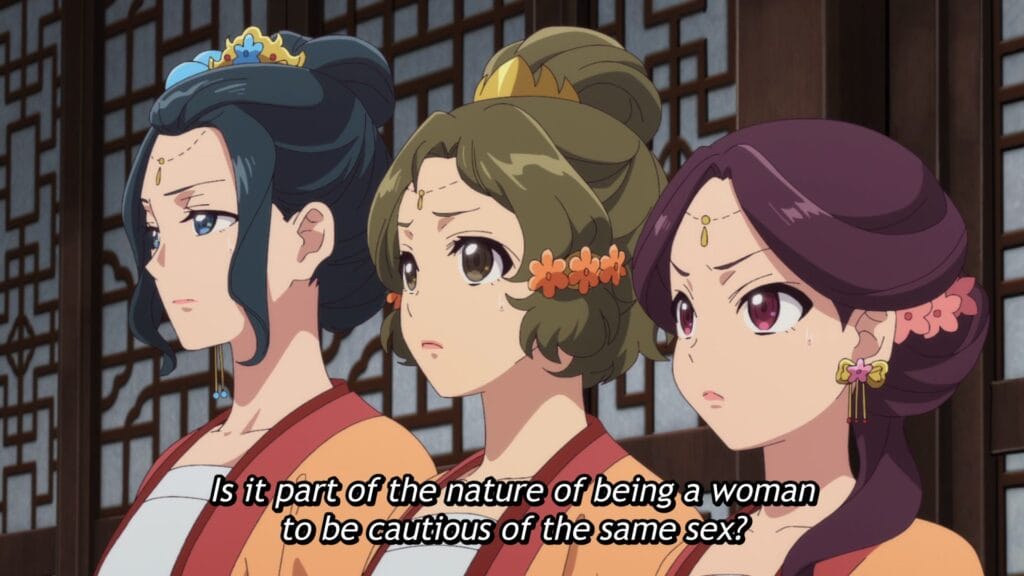
In a world seemingly designed to pit women against each other, Maomao emerges as a serendipitous champion of sisterhood. Later in the narrative, she poses a poignant question, dissecting the political intricacies and maneuvers of the concubines: “Is it part of the nature of being a woman to be cautious of the same sex?” This reflective inquiry adds a layer of complexity to her character, exposing the delicate intersections of gender dynamics, power struggles, and the enigmatic ballet of female relationships within The Apothecary Diaries. Maomao isn’t just a force of defiance; she’s a dazzling presence, proving that genuine glamour lies in liberating oneself from societal chains with a splash of rebellious chic
Elementary, My Dear Herbalist: Maomao’s Overture of Intrigue
As we venture in and beyond the first four episodes, we can see that Maomao’s character matures like a fine wine, her skills refined with each twist in the storyline. Unlike Sherlock, Maomao works mostly solo, emphasizing her prowess in a world teeming with complexities. Her youth adds an extra layer of brilliance to her character, proving age is just a number when it comes to unraveling enigmas. The captivating exploration of gender dynamics and female solidarity extends beyond the episodes, delving into the intricate intersections of the anime’s narrative with real-world practices.
One captivating example unfolds in the historical use of poison-infused cosmetics, a practice both dangerous and intriguing. People were aware of the risks, yet these toxic products were marketed and used for a considerable period before their eventual discontinuation. Maomao, with her keen deductions, becomes the lens through which we analyze and discuss these phenomena, showcasing herbrilliance. She reported that the white face powder was poison and cautioned against allowing the baby to touch it. Additionally, she shared that in the brothels where she grew up, many courtesans used high-end powder. According to her, most of them succumbed to poisoning, having attempted to trade life for beauty and ending up losing both.
Now, get ready for an immersive exploration as we continue our detective journey into the intriguing depths of this extraordinary tale. The first four episodes function as crucial pieces in a puzzle, intricately combining storytelling, character development, and world-building.

Episode 1: Maomao’s Debut: Unraveling the Palace’s Poisonous Secrets
In the first episode of The Apothecary Diaries, we encounter Maomao skillfully navigating the labyrinth of political intrigue and herbal mysteries in a world that is different from but not so unlike ours—the realm of Li.
The episode opens with Maomao’s seemingly routine task of delivering medicine. However, as the narrative unfolds, we witness her tenacity and cleverness in the face of familial expectations and societal norms. The vibrant characters, including the renowned Princess Pairin, Maomao’s “sister”, and the persistent suggestions of a courtesan life from Maomao’s “granny”, The Madam at the Verdigris House, a long-standing establishment in the red-light district of Li’s capital, weave intricate layers into the unfolding tale.

As Maomao explores the garden and becomes entangled in a kidnapping, we are swiftly immersed in the intricacies of her new life—a concealed realm within the rear palace where women bear the emperor’s offspring. The episode skillfully peels away layers, unveiling a hierarchy of concubines, servants, and eunuchs. With Maomao as our guide, we are granted a backstage pass to this clandestine world where, as Maomao explains, “The palace and the brothels are really similar.”In her idiosyncratic and cool demeanor, Maomao provides insights into the often overlooked lives of illiterate and disposable servants, laying the foundation for her preference for a lower-class existence with pay and autonomy over ascending the palace ranks. The narrative gracefully waltzes through power struggles, palace curses, and gossip, culminating in Maomao’s inevitable involvement in the intrigues of the palace as she inadvertently becomes the focal point for higher-ranking folks as she probes the enigma behind the mysterious illness afflicting the emperor’s infant heirs. Maomao succinctly encapsulates the challenges within the rear palace, remarking, “The rear palace is a garden of women who are to give birth to the emperor’s children.”
As Lady Lihua’s son succumbs to illness (and Lady Lihua soon falls ill herself), Maomao’s inquisitiveness ignites, and her deductive prowess takes center stage. The episode reaches its zenith as Maomao witnesses the public clash between Lady Lihua and Lady Gyokuyou. Armed with her apothecary background, she discovers poisonous lead hidden in make-up, the inadvertent use of which by their mothers was killing the emperor’s children, drawing the attention of the charismatic Master Jinshi. The episode’s denouement reveals the consequences of Maomao’s actions as she assumes the role of Lady Gyokuyou’s lady-in-waiting—an appointment she reluctantly accepts since she desired to maintain a low profile.
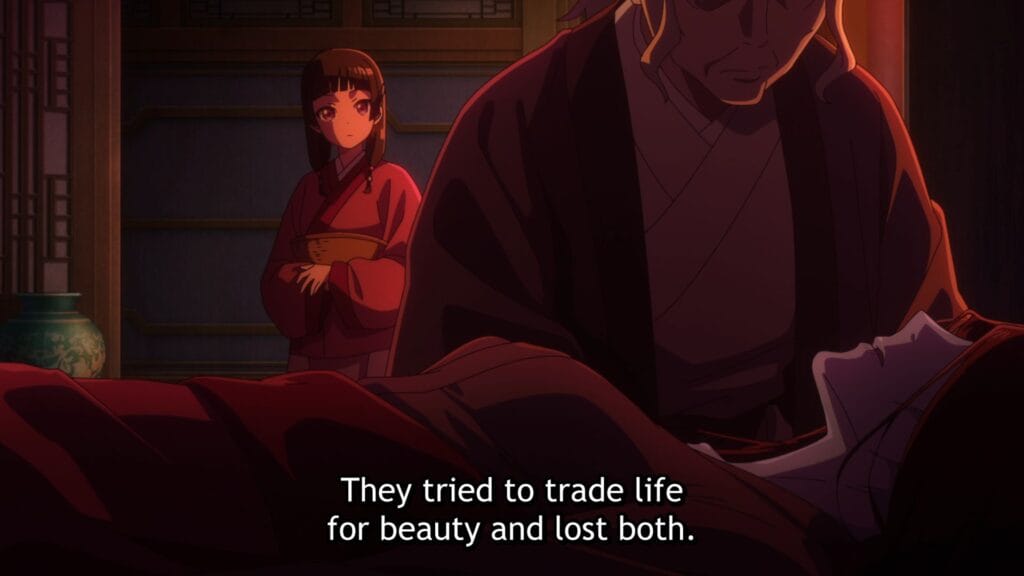
As the first act draws to a close, the stage is set, and the curtains gracefully descend. The narrative unfolds like a riveting theatrical performance, leaving the audience on the edge of their seats. In a captivating finale, two soldiers succumb to the insidious grip of poison, casting an ominous shadow over the impending acts. The closing scene tantalizingly hints at more mysteries waiting to be unraveled, leaving viewers eagerly anticipating the subsequent episodes of this toxin-laced narrative. The enigma deepens, and the echoes of Maomao’s debut linger in the air.
Episode 2: Maomao’s Concoctions: A Taste of Seduction
In this episode, we are enmeshed in the intricate web of palace intrigue, where Maomao’s unorthodox talents take center stage. The episode opens with the aftermath of the soldiers’ poisoning, casting a sinister shadow over the narrative.
Master Jinshi, the charismatic palace manager, steps into the spotlight, grappling with the consequences of the poisoning incident. The stage is set for a delicate dance of power, deception, and Maomao’s enigmatic proficiency. Gaoshun, Jinshi’s assistant, becomes a pivotal player, disclosing the arrest of the village leader on suspicions of aiding barbarians.
Jinshi, with a sagacious demeanor, articulates the essence of the unfolding narrative, noting, “Being constantly wary of everyone around them is the only way an emperor’s concubine can survive.” This quote captures the complex interplay within the imperial court, where survival hinges on perpetual vigilance.
Amidst the political murkiness, Jinshi endeavors to keep a watchful eye on Maomao, recognizing the potential dangers her apothecary knowledge poses. The stage welcomes Gyokuyou’s entourage at the Jade Pavilion, featuring the head lady-in-waiting Hongniang and the trio of Yinghua, Guiyuan, and Ailan, each adding a unique flavor to the unfolding drama.
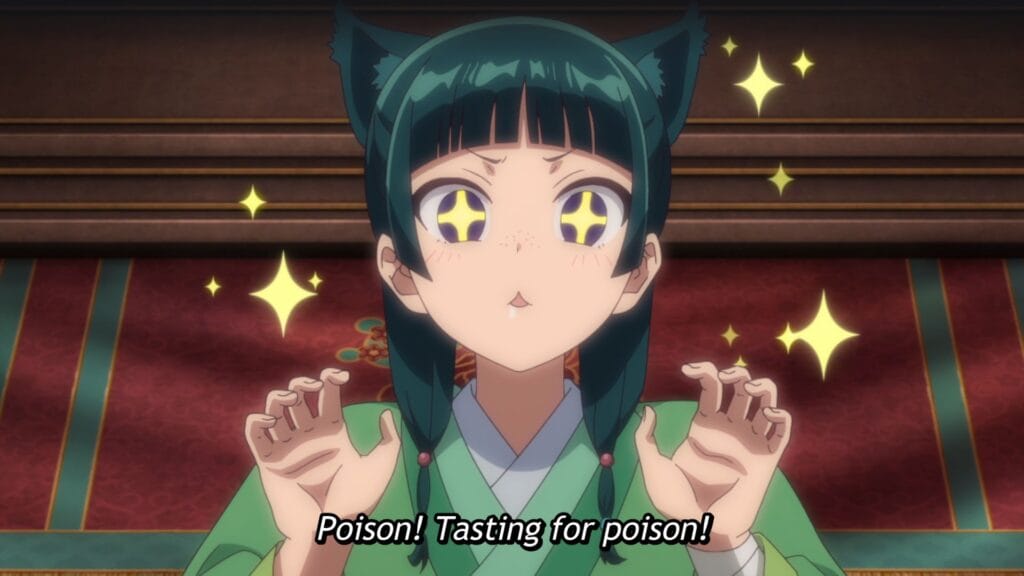
Maomao, in her unconventional approach, takes on the critical responsibility of conducting taste checks and exploringo the intricate art of discerning flavors and potential poisons. The scene unfolds with a unique blend of humor and suspense, showcasing Maomao’s nonchalant attitude toward handling substances that could prove lethal. “Back when I lived by the brothels, I ran a lot of experiments on my arm. I’ve gradually trained my body against poisons, so many of them have no effect on me,” Maomao explains, seamlessly integrating her past experiences with her present demeanor.
Navigating the complexities of her newfound role, when Hongniang says, “If you’d mentioned that you’re literate, you would have gotten paid more,” the conversation reveals Maomao’s reluctance to let those who captured her profit from her brilliance. Hongniang’s deliberate action of causing the vase to break is a clever strategy to ensure that Maomao can keep her money, preventing it from falling into the hands of her captors. This orchestrated incident highlights that solidarity and sorority are qualities not exclusive to Maomao alone. The episode gracefully dances through moments of monotony, testing, and culinary curiosity, portraying Maomao’s multidimensional character.
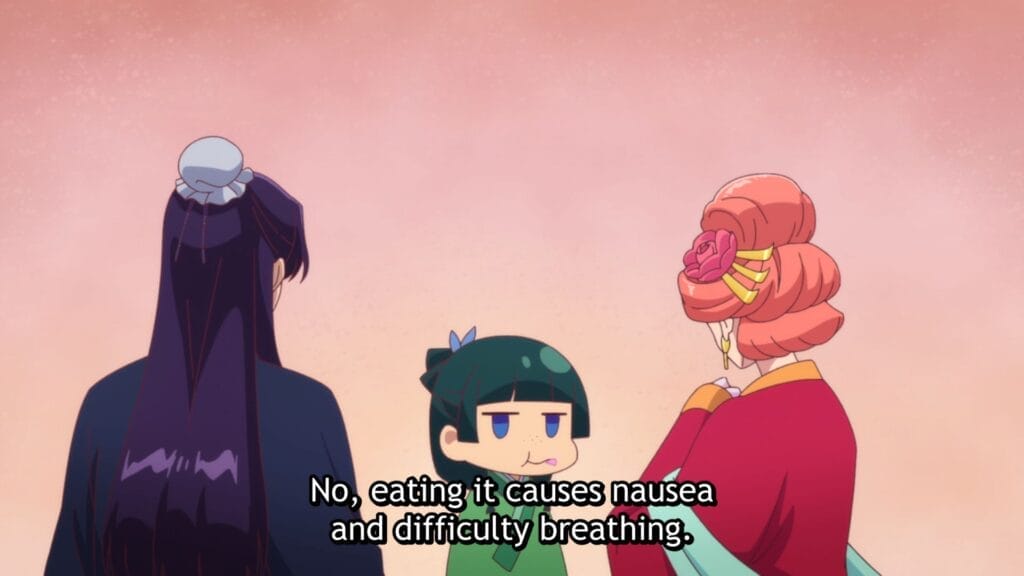
Later on, Jinshi’s request for an aphrodisiac introduces a new layer of complexity, leading Maomao to embark on a clandestine endeavor to create brownies infused with the mysterious concoction. Before that, Maomao solves the soldiers’ poisoning by exemplifying—once more using a rhododendron—how even in the rear palace they are surrounded by poisonous plants. “Some wood can even emit poison when burned,” she said, solving another poison-related case of suspicious demises.
In the episode’s denouement, a peculiar figure observing from a distance adds an air of mystery and anticipation. The curtains fall, leaving the audience in suspense, eager to witness the next act in this captivating drama. Act II concludes, leaving us tantalized by the intoxicating blend of seduction, experimentation, and the ever-unfolding layers of The Apothecary Diaries.
As the curtain descends on the second episode of The Apothecary Diaries, an enigmatic tableau unfolds—an unknown man, a silent observer in the shadows, casting an intrigued gaze upon an unsuspecting female. This cryptic closing scene serves as a narrative seed, planted to sprout into future revelations.
The silent exchange between the mysterious man and the unsuspecting female hints at the uncharted territory of secrets and veiled intentions, adding an extra layer of suspense to the unfolding drama. In the grand tapestry of palace intrigue, herbal mysteries, and Maomao’s eccentricities, this elusive figure emerges as a spectral presence, raising questions that demand answers.
Episode 3: Enigmatic Echoes
In the third episode of The Apothecary Diaries, a new narrative thread unfurls—a tale of sleepwalking spirits and the intricate webs of palace life. In this act, we are led to know a little more about the dedicated trio of Yinghua, Guiyuan, and Ailan, as they reminisce about their experiences within the rear palace while undertaking their daily cleaning tasks.
A whisper of unsettling rumors pervades the air—a mysterious spirit haunting the rear palace. Maomao, our astute Sherlockian Kitty, encounters these tales and engages in discussions with Xiaolan to discern the truth. Is it a phantom lurking in the shadows, or a mere ghost story designed to instill fear?
Xiaolan adds to the enigma, stating, “They say a ghostly lady in white dances in the air under the moonlight!”
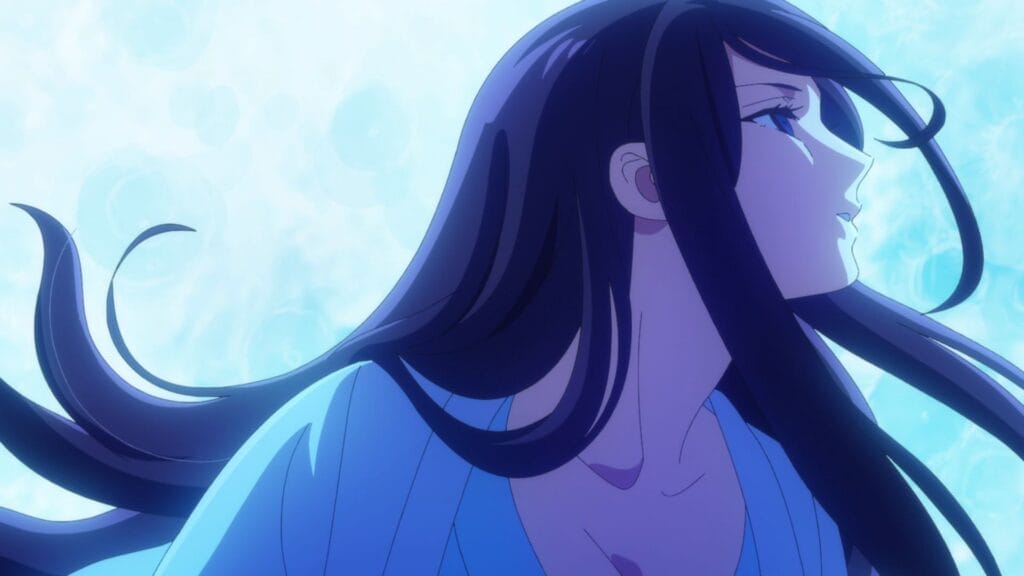
However, Maomao, with her characteristic skepticism, dismisses the supernatural claims, revealing, “They say that sunken in the moats are… The corpses of concubines who tried to escape. In other words, just your typical ghost story. It’s just a rumor.”
Later on, Maomao encounters the rear palace’s doctor, their previous tension now tinged with an air of care. However, her interactions with Jinshi, the charismatic palace figure, persist, raising questions about his true role within the palace’s hierarchy.
Guided by Gaoshun, she then meets Concubine Fuyou, entwined in a fate that involves being bestowed upon a military officer. The intricate dance of political rewards and the consequences of societal expectations unravel as Maomao delves into Fuyou’s sleepwalking predicament. Through comparisons to the cotton rose, and the Hibiscus mutabilis, also called the fuyou rose, Maomao formulates a theory, intertwining the narrative with the delicate symbolism of change. The mesmerizing transformation of colors within this singular plant becomes a poetic reflection, echoing themes of metamorphosis and the timeless flow of existence. This botanical ballet gracefully weaves into the intricate narrative, enhancing its allure with nuanced symbolism and an air of poetic mystique.
Maomao unveils the secret behind this enchanting flower, drawing a parallel between the fuyou flower, also known as the cotton rose, and the concubine Fuyou. She explains, “The fuyou flower blooms as a large white flower in the morning. However, by evening, it turns a deep pink.” This revelation adds a layer of beauty and symbolism to the unfolding tale, creating a poignant reflection of the flower’s dynamic nature — a portrayal of the apparent two distinct personas within the flower’s namesake.
In a delicate interplay of past and present, and as the layers of palace life, themes of separation, and internal conflicts are artfully woven into the narrative, Maomao, embodying the essence of sisterhood, takes a decisive step forward, dedicated to guiding Fuyou along the path to happiness and into the arms of her one true love.
Gyokuyou, grappling with her own emotions, muses, “Would it make me a terrible woman if I said I envy Concubine Fuyou?”
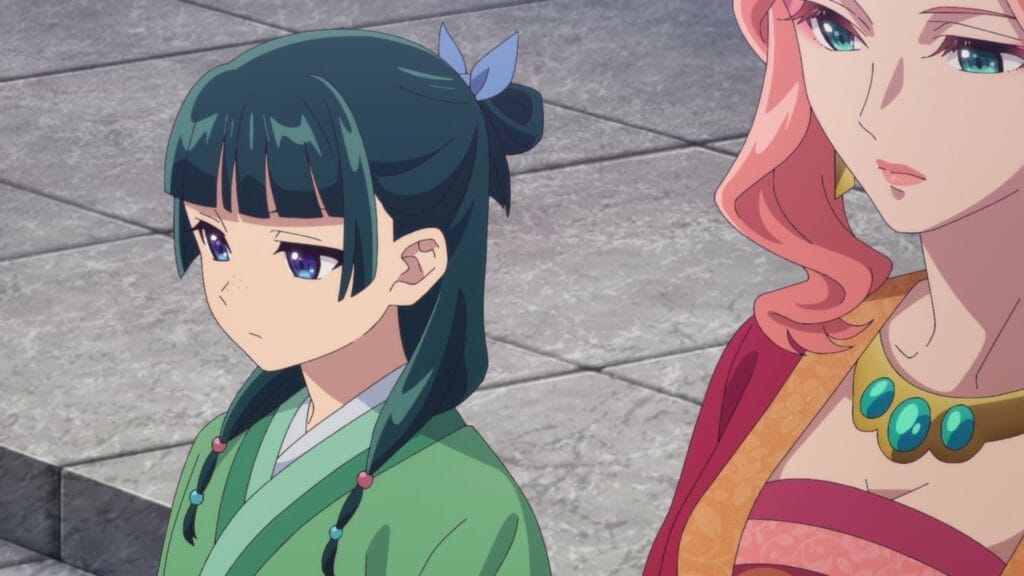
The episode unfolds with Maomao’s insightful reflection, posing a thought-provoking question, “If love makes a woman beautiful, what kind of medicine would it make?”
The episode concludes with an air of mystery as a man approaches Gyokuyou with a request for Maomao, leaving viewers intrigued about the next chapter in this alchemical drama. The Apothecary Diaries continues to captivate with its multifaceted storytelling, exploring themes of separation, societal expectations, and the enigmatic echoes that resonate within the rear palace’s walls.
With each episode, the series deftly weaves a tapestry of herbal mysteries, political intricacies, and the indomitable spirit of our protagonist, Maomao. This enigmatic request introduces a new twist, leaving viewers on the edge of their seats, eager to unravel the secrets that lie ahead. Join us in the next installment as we delve deeper into the alchemical journey, where each revelation adds a drop to the elixir of suspense and keeps us enchanted in the world of ancient-China-inspired mysteries.
Episode 4: Conclusion: Remedial Touch
In the enthralling fourth installment of The Apothecary Diaries, Maomao takes center stage in a new role: the caretaker of Lady Lihua. The episode unfurls with the aftermath of poison-check duties for the Emperor, swiftly transitioning to Maomao’s unexpected assignment of tending to Lihua’s ailing health.
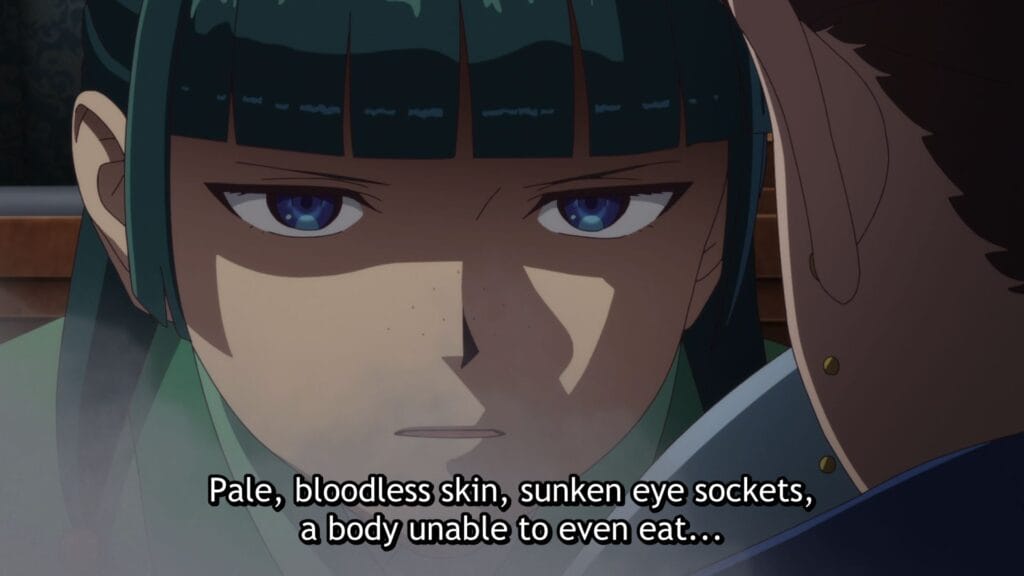
As the narrative progresses, we witness the clash of societal expectations and imperial orders, with Lihua’s entourage disapproving of Maomao’s low-class culinary offerings. Undeterred, Maomao embarks on a mission to concoct a dietary remedy that aligns with Lihua’s weakened state, despite facing resistance from the obstinate servants.
In a twist orchestrated by Jinshi’s beguiling charm, the intricate dance of palace politics takes an unexpected turn. In a mesmerizing revelation, Maomao, our alchemical enchantress, unfurls the tendrils of a perilous misunderstanding entangled in poisonous makeup. This revelation not only highlights her profound apothecary acumen but also underscores her unwavering commitment to safeguarding those under her protective wings.
As this episode unveils its captivating narrative, it not only opens new doors but gracefully concludes a cycle initiated in the first episode—a cycle entwined with the mysterious allure of toxic cosmetics. In the symphony of palace intrigue, Maomao’s resolute steps echo, closing one chapter and setting the stage for the enigmatic melodies that lie ahead.
The climax builds with Maomao’s compassionate treatment, resolving the poison predicament, and unveiling the intricacies of palace politics. The episode reaches a poignant resolution as Lihua, on the path to recovery, questions Maomao about her chances of bearing children and contemplates her standing with the emperor.
Lady Lihua, haunted by regret, confesses, “I ignored those words of advice and let my child die. Will I be able to win against Concubine Gyokuyou?”
In response, Maomao imparts a profound perspective, stating, “It’s not a matter of winning and losing. There are hundreds, thousands of flowers in the world, but who can decide whether a peony or a bellflower is more beautiful?”
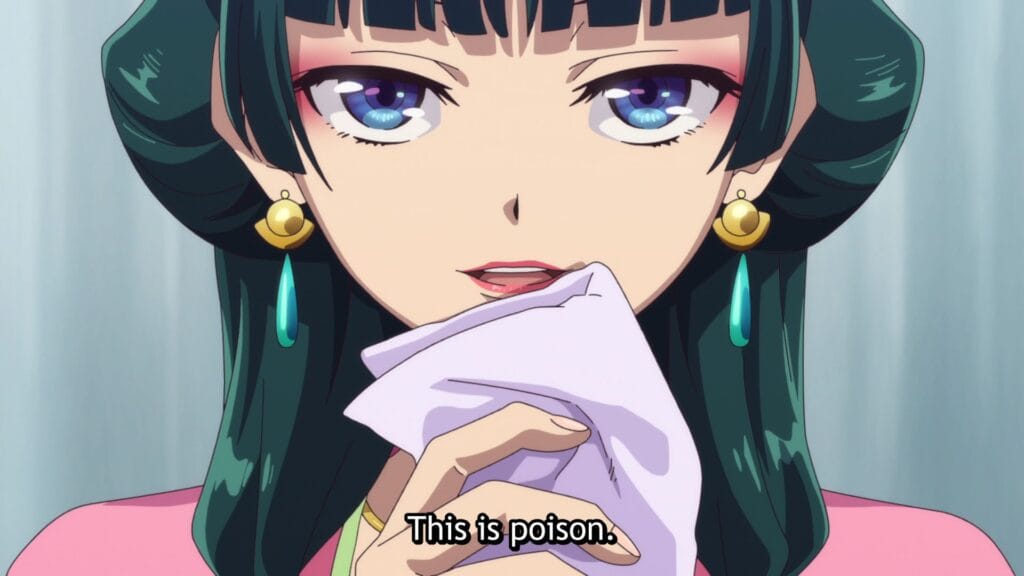
Maomao’s whispered advice to Lihua introduces a subtle yet impactful shift in dynamics, adding a layer of complexity to their relationship. The episode concludes with a cryptic teaser, as someone within the royal palace falls victim to what seems to be an ominous curse. With each new episode, filled with apothecary expertise, sleuthing, and more, the story remains intriguing, promising viewers a captivating journey through the intricacies of imperial politics.
In this episode, Maomao’s versatility is showcased, not just as a skilled apothecary but as a compassionate caregiver navigating the labyrinth of palace intrigues. The animation consistently upholds its visual splendor, seamlessly complementing the enthralling narrative. As the curtain falls on this episode, anticipation builds for how Maomao will confront the looming threat and navigate the ever-shifting currents of imperial politics.
Brewed Deceptions: Decrypting Realities in The Apothecary Diaries
The Apothecary Diaries, while ensconced in the mystique of ancient-China-inspired settings, subtly weaves threads of reality into its narrative fabric. One captivating instance is the revelation of poisonous makeup, a seemingly fantastical element that echoes historical truths.
In the annals of history, cosmetics often concealed a darker reality beneath their alluring veneer. Lead-based face powders, arsenic-laden rouge, and mercury-infused beauty concoctions were prevalent in various cultures. The pursuit of beauty, albeit unwittingly, led individuals to adorn themselves with substances that, over time, took a toll on their health.
As The Apothecary Diaries masterfully blends reality and fiction, it beckons viewers to explore the historical roots of its narrative elements. The poison-laced makeup subplot in the series not only introduces an exhilarating twist to the narrative but also pays homage to these historical dangers concealed within beauty practices. Maomao’s sharp discernment of the toxic makeup and her decisive intervention positions her as a guardian against perilous customs, resonating with historical struggles against unwittingly harmful beauty standards. This use of poisonous makeup draws parallels with historical instances where poisonous cosmetics were embraced for aesthetic purposes.
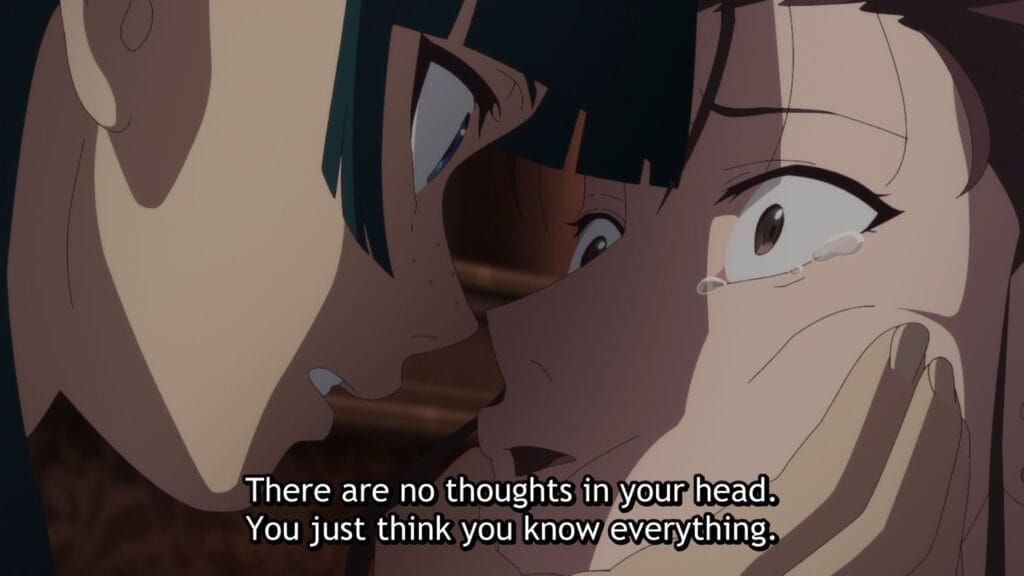
The storyline vividly captures the inherent risks tied to beauty rituals, infusing the narrative with a layer of authenticity and thought-provoking reflection. The poison in the makeup becomes a metaphorical mirror reflecting the perils of historical beauty standards, inviting audiences to ponder the sacrifices made in the name of allure.
Additionally, the focus on Lady Lihua’s dietary concerns parallels historical practices, where food and medicine were often intertwined. Traditional Chinese medicine, for instance, emphasizes the therapeutic properties of certain foods. Maomao’s meticulous crafting of a dietary remedy aligns with historical traditions recognizing specific culinary choices’ healing potential.
The anime’s portrayal of palace politics and the delicate dance of power within the imperial court finds resonance in historical accounts of court intrigues. The intricacies of relationships, the impact of imperial favoritism, and the nuanced dynamics between concubines bear semblance to the historical realities of royal courts worldwide.
In this enchanting alchemical odyssey, The Apothecary Diaries’ world-building and storytelling masterfully weave together the threads of fantasy and history, creating a mesmerizing narrative tapestry. As the story unfolds, each elixir and intrigue acts as a conduit, echoing with whispers of historical resonance.
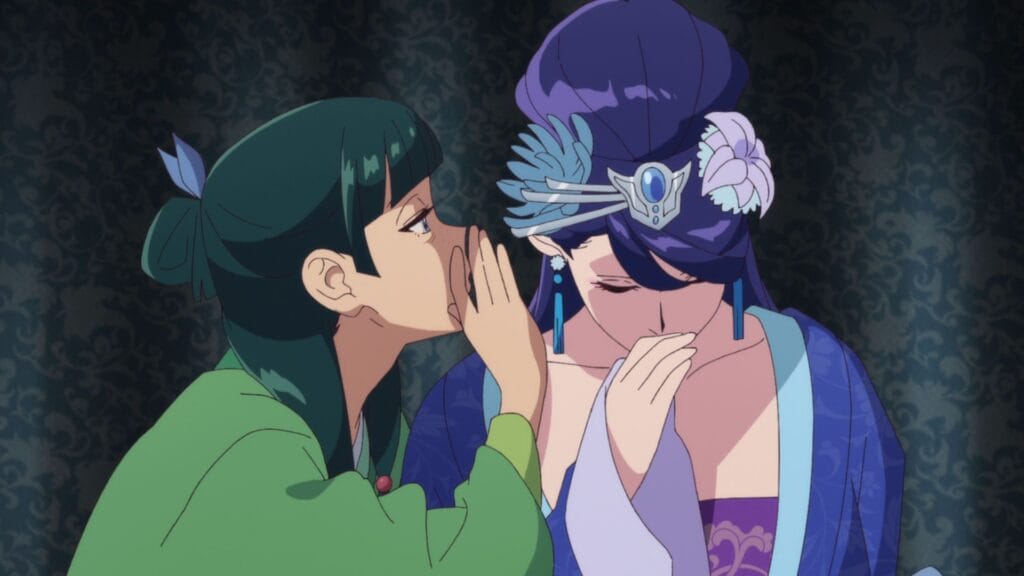
If you haven’t yet explored the enchanting world of The Apothecary Diaries, now is the perfect time to embark on this captivating journey, where potions and plot twists reveal a rich blend of imagination and echoes from the past. The series is available for streaming on Crunchyroll. The series’ first season just concluded on March 23, 2024, and a second is set to premiere in 2025. Catch up on the magic and immerse yourself in a realm where fantasy and history converge. Don’t miss the chance to join the adventure!
As we traversed the enthralling landscape of the first quartet of episodes, enduring themes of palace intrigue, gender dynamics, and female solidarity, where historical intersections emerged like constellations in the narrative sky. Maomao, our Sherlockian protagonist, rises as a luminous beacon of resilience in the world of The Apothecary Diaries—an exemplar to be revered not only within the realms of fiction but also as a real-world inspiration. In the clandestine world of unraveling mysteries, she stands shoulder to shoulder with Sherlock, our girl, armed not only with potions but also with an air of enigmatic coolness that transcends time and cultural boundaries.
Maomao becomes a symbol to emulate—a testament to the strength found in determination and intelligence. As she navigates the intricate tapestry of historical mysteries, her unwavering resolve mirrors the strength of countless real-life individuals breaking through societal constraints.
Elementary, my dear reader, for in the hallowed halls of deduction, Maomao pursues clues and unmasks mysteries with a feline grace that is truly enchanting. The Apothecary Diaries, with its spellbinding narrative and formidable protagonist, invites us to reflect on the echoes of the past and to release that indomitable spirit that resonates across time and borders.
The Apothecary Diaries isn’t your grandma’s tea party; it’s a cool cat’s rebellion against the status quo, where stereotypes are shattered, and mysteries are unmasked with a tail swish. Here’s to Maomao—rewriting the rules with a wink and a whisker!


